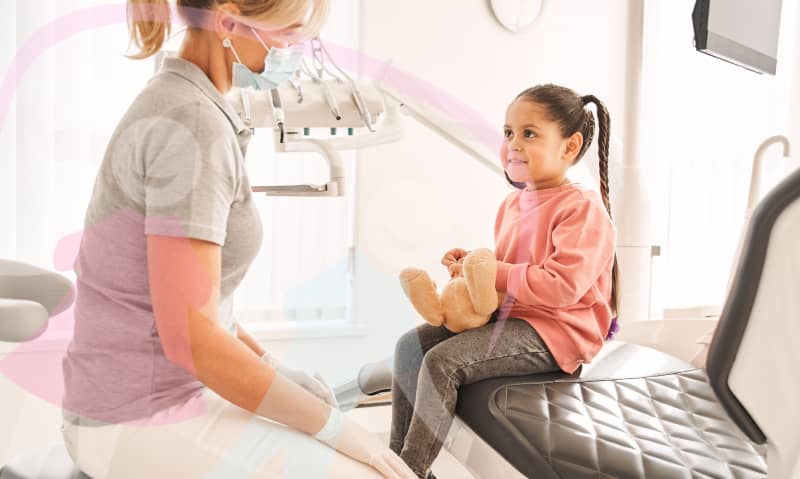7 Reasons to Get an Orthodontic Evaluation by Age 7

Why Early Orthodontic Evaluations Matter
The average age for braces is between 12 and 14, but children should have orthodontic evaluations much sooner than this. The American Association of Orthodontists recommends every child see an orthodontist for the first time no later than their 7th birthday.
Early orthodontic evaluations play a vital role in the proper development of your child’s smile. Your child’s orthodontist will have a valuable opportunity to spot signs of trouble and intervene before malocclusion or misalignment has a chance to worsen.
Here are our top seven reasons why we encourage parents to book an orthodontic evaluation for their children by age 7.
1. Orthodontists can detect problems before they are invisible to the naked eye.
Orthodontists and pediatric dentists with orthodontic education see your child’s smile through expert eyes. Your child’s teeth might look straight, but a lot is going on under the surface that you can’t see.
Orthodontists also have experience anticipating the future development of a child’s smile, including when they may lose their baby teeth, how the teeth may shift as the jaw grows and matures, and if a child is more prone to developing crooked teeth or a misaligned bite.
Most importantly, orthodontists can step in and provide interceptive treatment, a form of early orthodontic care, typically a one-phase or two-phase plan. Your child may need some early care now and then a short treatment with braces as a young teen.
2. Palatal expanders can prevent future issues with crowding or overlapping teeth.
Crooked, crowded, and impacted teeth are often reasons kids or teens get braces. There are different reasons for overcrowding, but one common cause is a lack of space along the jawline.
Just as you might have had your wisdom teeth removed because there wasn’t enough room, your child’s incoming adult teeth can face a similar challenge. Palatal expanders amplify the space in your child’s jaw to allow baby teeth to shed and adult teeth to come in while diminishing the chances of impaction or crowding.
3. Space maintainers help keep teeth properly aligned after the premature loss of a baby tooth.
Space maintainers are another form of early pediatric orthodontic care that significantly impacts your child’s future smile.
Children that have lost a baby tooth too soon or have congenitally missing teeth often develop misaligned teeth due to the gaps in their smiles. Space maintainers keep the gap open for the adult tooth to push through while also providing support to the neighboring teeth by keeping them aligned.
4. Orthodontists can help curb thumbsucking or open-mouth breathing habits before damage occurs.
Prolonged thumbsucking habits and pacifier use can cause a poor bite if the behavior continues for too long. Open-mouth breathing is another habit that can negatively impact the development of your child’s teeth and jaw.
An orthodontist can evaluate these behaviors, see if any damage is beginning to occur, and intervene with early care to stop further misalignment if teeth are already shifting.
5. Interceptive treatment may prevent the need for braces at a later age, or speed up treatment at a future time.
Following through with interceptive care recommendations is always beneficial for your child.
Depending on the age of your child and the malocclusion the orthodontist finds, it’s possible that opting for interceptive treatment is all the orthodontic care your child will need. Even if your child needs braces in the future, early orthodontic care is still advantageous because it will make future treatment more effective and will take less time to complete.
6. Interceptive treatment can give your child results that may not be possible if orthodontic care is postponed.
Another consideration is that the results of interceptive treatment can’t necessarily be duplicated at a later age.
In more complicated cases, early orthodontic care is the only option for alleviating severe malocclusions that can’t be completely fixed when your child is older. This is due to the structural changes that happen in your child’s jaw and facial structure as they mature.
7. You’ll have confidence knowing your child’s smile is developing correctly and what the future might hold.
Just like routine check-ups provide you with peace of mind that your child’s smile is cavity-free, orthodontic evaluations give you confidence that your child’s smile is growing as it should be.
Additionally, early orthodontic evaluations can give you valuable insight into the future of your child’s dental care needs. If interceptive treatment isn’t necessary, the orthodontist can still tell if your child will need braces in the future. Having this information will give you time to prepare financially and save you from a surprise discovery later.
Book Your Child’s Orthodontic Evaluation Today
Pediatric Dental Specialists of Greater Nebraska provide complete dental care services, including orthodontic evaluations in four convenient locations.
Your child’s dentist will examine their smile, review X-rays of their bite alignment, and provide insightful information on the development of your child’s smile. If the dentist finds that your child would benefit from interceptive care, they will explain why and begin developing the first phase of your child’s treatment plan.
Schedule your child’s appointment by calling our office or by requesting an online visit.